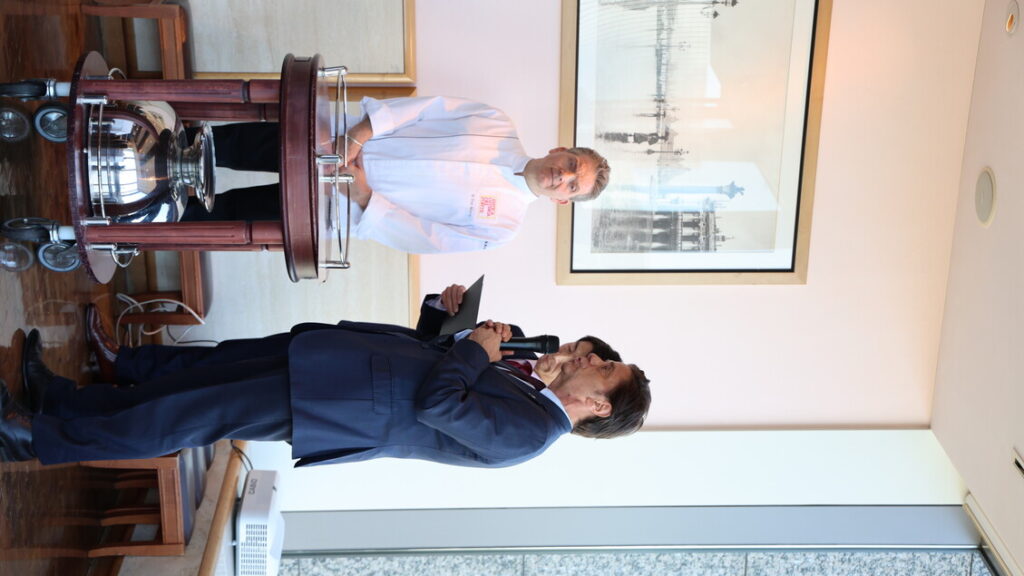The opening of the tenth edition of the Week of Italian Cuisine in the World (SCIM) was organized by the Embassy of Italy in Japan, in collaboration with the ICE Office in Tokyo and the Italian Academy of Cuisine, delegation of the Japanese capital, through a press lunch dedicated to the condiments symbolic of our gastronomic tradition: from extra virgin olive oil, wine vinegar, balsamic vinegar and sea salt. In fact, the theme of the current edition, “Italian cuisine between health, culture and innovation,” intends to offer an opportunity to tell about its essential role in the preparation of dishes to highlight its potential in the encounter with Japanese cuisine, creating an authentic cultural and gastronomic bridge between the two countries. The presentation was held in the elegant setting of the Antica Osteria del Ponte in Tokyo with the participation of 27 local journalists. In preparation for the UNESCO vote on the nomination of Italian Cuisine as an intangible heritage, scheduled for December 10, 2025, the event was opened by Andrea Desogus, Vicar of the Commercial Office of the Embassy of Italy in Tokyo, followed by the message of the Attaché for Agri-food Policy, Anna Iele – who recalled how Tokyo is the city with the largest number of Italian restaurants outside Italy, with more than 5,000 businesses, in addition to the 20,000 scattered throughout Japan. The Delegate of the Italian Academy of Cuisine, Emanuela Orighi, gave a technical talk dedicated to the uses and properties of condiments, enriched by anecdotes about the use of such ingredients in Italian culture, even outside the strictly culinary context. In conclusion, the Director of the ICE Tokyo Office, Gianpaolo Bruno, recalled the work of the institutions in the face of the strong interest of Japanese citizens in Made in Italy food. “ICE’s commitment is aimed at satisfying Japanese consumers who are increasingly sophisticated and demanding, attentive to the quality, provenance and history of products, and initiatives like this are an essential part of our institutional mission and this path.” The event anticipates the launch of promotional activities that will be held from Nov. 24 to Dec. 7 and will involve a total of eight restaurants: six Italian and two Japanese, with the aim of creating fusion effects and new flavor combinations. During the two weeks, information cards prepared by the Italian Academy of Cuisine and dedicated to condiments will be distributed to guide consumers to discover their characteristics and uses. Cardinal Group restaurants will offer amuse-bouche and dishes dedicated to the theme of promotion, helping to support the UNESCO candidacy. Agribusiness confirms itself as a driving sector of the Italian economy: in 2024, total exports reached 70 billion euros (+7.5 percent), while the first half of 2025 recorded a further increase of 6.5 percent. In this context, Japan represents a strategic and high-level market for Italian goods, even in light of the restrictions imposed in the United States with the introduction of tariffs. “The big Japanese institutions we collaborate with ask us that it be real Italian cuisine, especially something that can last,” Stefano Dal Moro, Executive Chef of Antica Osteria del Ponte, tells ANSA. “This, for example, has been open for 23 years: Mitsubishi asked us to make such a restaurant in 2000, we opened it after two years of preparation and it works very well. We have also created a chain of trattorias where we promote a concept of regional cuisine, offering different territories and recipes. In this way the Japanese chefs who work with us are very stimulated. It is a very interesting concept that continues to be successful.”
ALL RIGHTS RESERVED © Copyright ANSA


Dining and Cooking